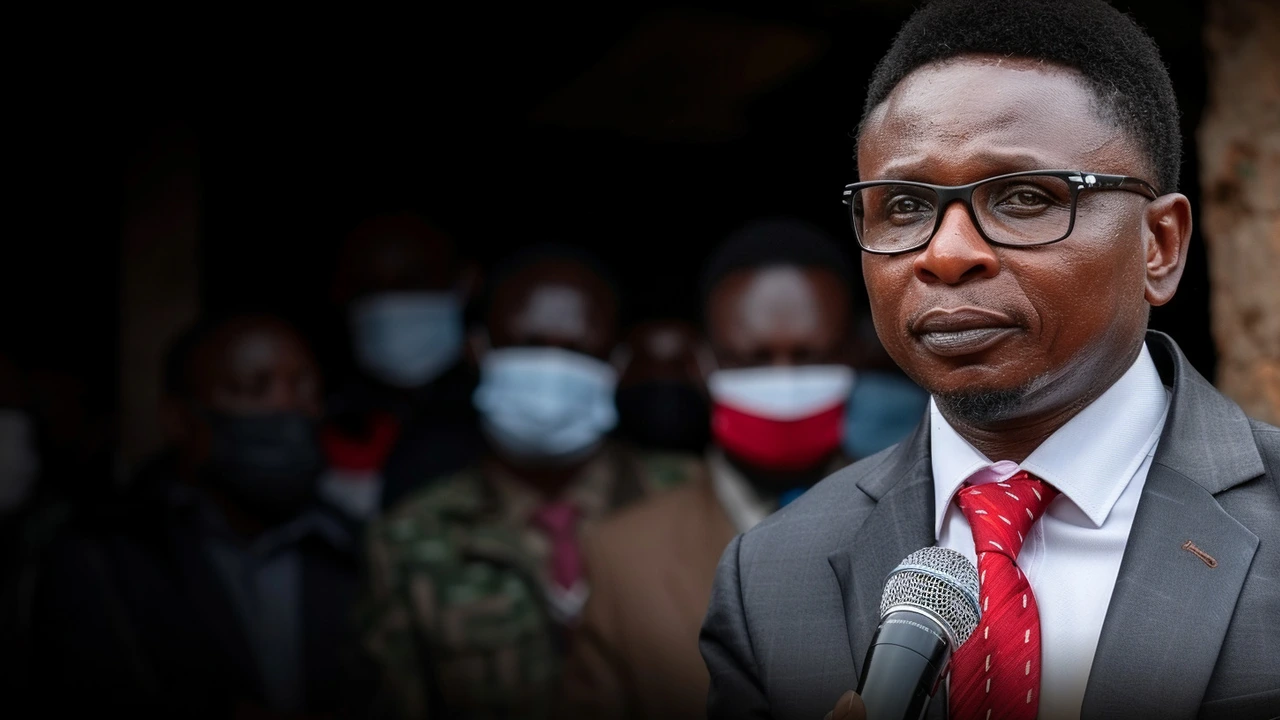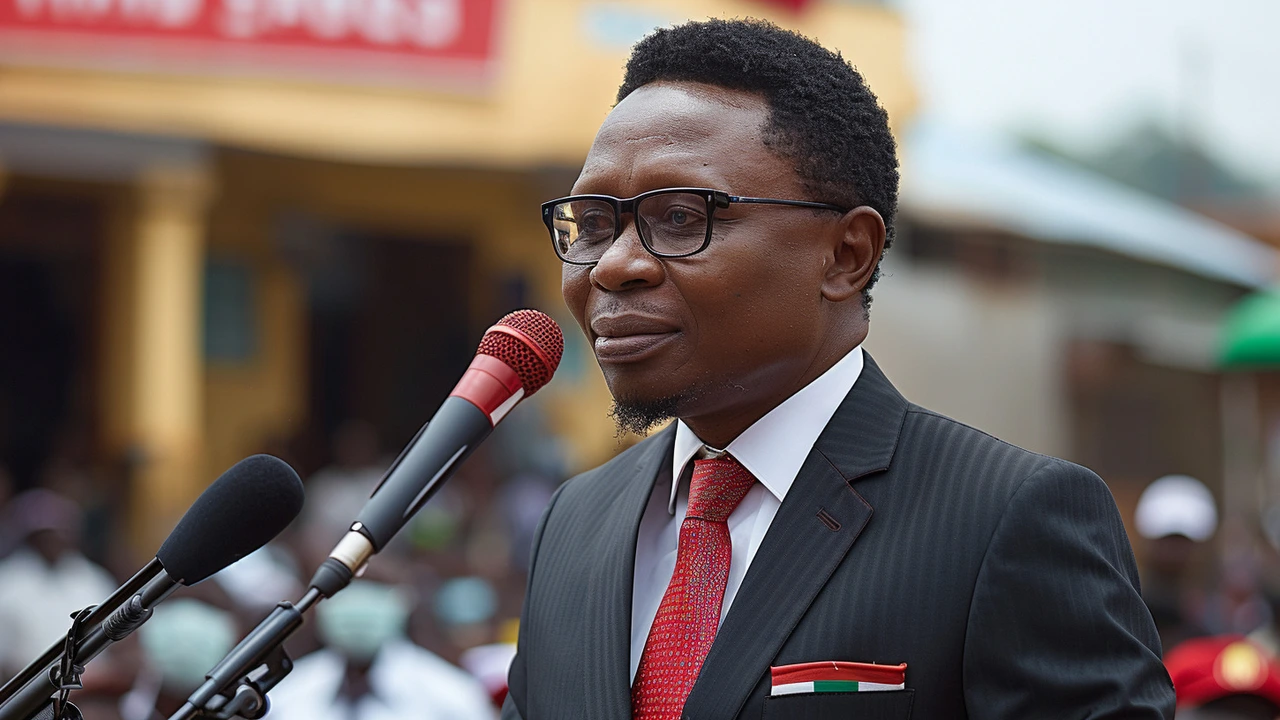CS Ababu Namwamba Faces Backlash at Fred Omondi's Memorial over Government's Support for Artists
On a somber Saturday, June 22, 2024, the Nyayo National Stadium in Nairobi became a theater of rising tensions as CS Ababu Namwamba, the Cabinet Secretary for Sports, Youth, and Arts, faced an unexpected wave of hostility. The occasion was the memorial service for the late, beloved comedian Fred Omondi, whose untimely death on May 18, 2023, at the age of 41 had left a void in the heart of Kenyan comedy. The event was anticipated to be a solemn tribute filled with fond remembrances and heartfelt eulogies. However, it quickly transformed into a focal point for the deep-seated grievances and frustrations of the artistic community.
As CS Ababu Namwamba ascended the podium to deliver his speech, he was greeted not with respectful silence, but with a chorus of boos and jeers emanating from the crowd. The Cabinet Secretary, known for his eloquence and poise, found himself struggling to penetrate the wall of discontent that surrounded him. The crowd's hostility was palpable, a stark reflection of the mounting dissatisfaction with the government's perceived neglect of artists and comedians during their lifetimes. Artists, who had felt unsupported and undervalued while alive, were incensed by the posthumous praise and recognition showered upon them after their deaths. This feeling of betrayal came to a head as Ababu attempted to address the memorial attendees.
The irony of the situation could not be overstated. Here was a government official who had come to honor a figure who, during his life, had brought laughter and joy to countless Kenyans, but who many felt had been let down by the very system that now paid its respects. The outburst from the crowd highlighted a critical issue within Kenya’s creative industry – the perceived lack of tangible support and investment from the government. The sector, which is rich in talent and potential, often struggles with inadequate funding, poor institutional support, and limited recognition.
Government's Track Record on Arts Support Under Scrutiny
The criticism directed at Ababu Namwamba was underpinned by a broader discontent with the government’s track record on arts support. For many artists and performers, the perceived lip service and empty promises from those in power have become too familiar. Despite numerous declarations of support and plans to bolster the creative industry, many believe that little has been implemented to effect real change. This perceived neglect has left a bitter taste, one that was all too evident at the memorial service.
Fred Omondi's career, marked by his keen wit and poignant social commentary, had made him a household name. Omondi was celebrated not just for his ability to entertain, but also for his skill in addressing pressing societal issues through humor. Nonetheless, his passing, much like that of many other artists before him, sparked conversations about the systemic struggles faced by those in the creative sector. These struggles encompass a range of issues, from financial instability and lack of health benefits to inadequate public platforms and insufficient government support.
Ababu’s reception was a testament to the frustration that these issues have generated over the years. Artists, comedians, and performers present at the service echoed a resounding call for the government to move beyond words of condolence and promises. Utilizing the moment to speak out, many attendees stressed the need for substantial policies and initiatives that would support and sustain the creative arts sector. This push for accountability and action was reflected in the emotional and vehement response to Ababu's speech.
The Memorial Service: A Gathering of Luminaries and Discontent
The memorial service itself was a significant event, drawing a diverse array of dignitaries, including fellow comedians, artists, and government officials. It was meant to serve as a celebration of Fred Omondi’s life and legacy, an opportunity to commemorate his contributions to Kenyan culture and entertainment. However, the backdrop of discontent cast a shadow over the proceedings. The unity in grief was juxtaposed with a unity in protest, as voices rose not just in mourning, but in demand for change.
Amid the tributes and elegies, there was a palpable sense of urgency and impatience. Many in attendance were not merely grieving the loss of a beloved comedian, but also voicing their collective exasperation with a system that many felt had failed them. This sentiment was perhaps most strongly felt when Ababu was forced to cut short his speech and leave the stage. The image of the Cabinet Secretary, retreating amidst a flurry of boos, captured the essence of the crowd's sentiment and the broader issues plaguing the artistic community.
Despite the disruption, the memorial service pressed on, with numerous speakers taking to the stage to share their memories and reflections of Fred Omondi. Among these voices were colleagues and contemporaries who spoke of Omondi’s impact on their lives and careers. Their words painted a vivid picture of a man who, through his work, had touched the lives of many and left an indelible mark on the cultural landscape of Kenya. Yet, beneath the remembrances lay an undeniable undercurrent of critique – a call for the government to recognize and rectify its shortcomings in supporting the arts.
The Road Ahead: Calls for Change
In the wake of the memorial, discussions about the future of the creative arts sector in Kenya have gained renewed momentum. Artists and performers are actively engaging in dialogue about the steps needed to change the status quo. Key among their demands are calls for increased funding, better healthcare provisions, and more substantial institutional support. There is also a push for greater recognition of the arts as a vital component of Kenya’s socio-economic fabric.
Ababu Namwamba, for his part, has acknowledged the incident at the memorial and expressed his commitment to addressing the concerns raised. Speaking to the press later, Ababu emphasized the importance of listening to the voices of artists and pledged to facilitate further discussions aimed at developing comprehensive support mechanisms for the creative industry. His statements, while welcomed by some, have been met with a mixture of cautious optimism and skepticism. Many within the arts community view such promises with a degree of reservation, preferring to wait for concrete actions rather than words.
As the nation reflects on the life and legacy of Fred Omondi, his memorial has catalyzed a broader conversation about the role of the arts in society and the responsibilities of those in power to nurture and sustain this vital sector. The clash at Nyayo National Stadium has brought these issues to the forefront, highlighting the urgent need for a more robust and supportive framework for artists. The hope is that this incident will serve as a turning point, sparking meaningful changes that will honor the contributions of artists not just in death, but throughout their lives.

A Call to Action
The events at Fred Omondi’s memorial are a poignant reminder of the need for continued advocacy and action. The frustration displayed by the crowd toward CS Ababu Namwamba underscores a collective yearning for genuine support and recognition. It also serves as a call to action for the government to deliver on its promises and ensure that the arts, which are so integral to the nation’s identity and culture, receive the attention and resources they deserve.
Going forward, it will be crucial for stakeholders across all levels to engage in meaningful dialogue and collaboration. Artists, government officials, and the public must work together to craft policies and initiatives that will provide a solid foundation for the arts to thrive. Only through sustained effort and commitment can the creative industry in Kenya hope to overcome its challenges and reach its full potential. The legacy of Fred Omondi, and all those who have paved the way with their talent and labor, calls for nothing less.

Write a comment